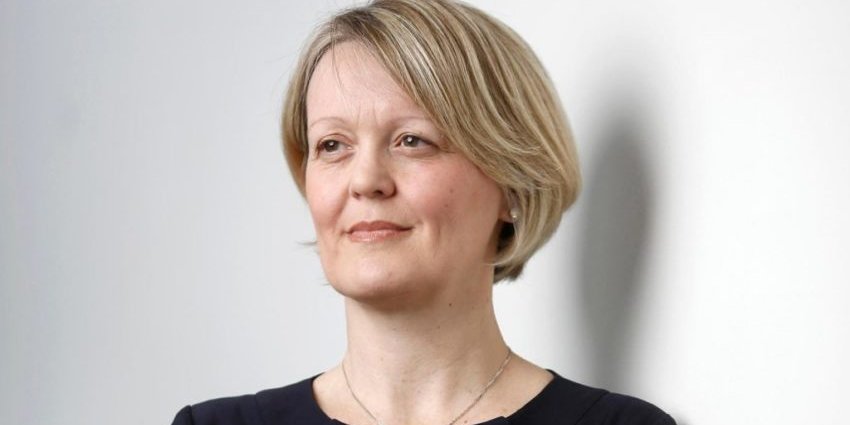Alison Rose, the former CEO of NatWest, made history as the first woman to lead a major UK bank. Now a senior adviser to the private equity firm Charterhouse, she is widely recognised for her commitment to female entrepreneurship and sustainability.
Rose chaired the 2019 Alison Rose Review on Female Entrepreneurship and has served on two government committees focused on climate change. Her work reflects a broader vision for the financial services industry, emphasising trust, responsibility, and the sector’s role in building a fairer, more inclusive society.
Here, she shares her insights into leadership, digital transformation, female entrepreneurship, and sustainability.
Alison Rose on Joining NatWest and the Qualities of a Good CEO
Rose joined NatWest as a graduate trainee straight out of Durham University in 1992. Reflecting on that time, she admits she had “no idea what [she] was getting into,” but found the graduate programme to be “great fun.”
“The great thing about a graduate programme is you’ve got to try lots of different things. Most importantly, you learn a huge amount about yourself. Then you figure out what you like and what you’re good at and you evolve,” she says.
While Rose enjoyed the experience, she never expected banking to become her long-term career: “I really thought I’d be in banking for two to three years and then go and do something else.”
She also never anticipated becoming a CEO: “It was all about trying to learn… You develop your own leadership style, you sort of borrow from other people and then you find yourself.”
Dame Alison Rose adopted various management approaches to shape her leadership style, describing herself as a “magpie” who picks up techniques from others.
Rose believes that CEOs must “lead through ambiguity and with authenticity.” She also firmly believes that banking is a “team sport.” Leading large organisations requires trust in a strong team, as CEOs can’t oversee every aspect of the business.
Career Advice
Rose has enjoyed a highly successful career and offers valuable advice for women navigating their professional journeys. When choosing a role, she believes two essential ingredients are working with great people and taking on jobs that challenge you.
Additionally, Rose emphasises the importance of investing in yourself, staying curious, and having the courage to pursue what excites you. She also highlights the value of networking with people who challenge and stimulate your thinking and finding mentors suited to your evolving career.
Rose advises: “Don’t sweat the small stuff, it is nothing in the arc of a career. Keep your perspective on things.” In contrast, she says the worst advice she ever received was to try to be like someone else. Her message to her 20-year-old self would be: “Go for it, believe in yourself, and just be yourself.”
Alison Rose on How Banking Has Changed
Digital banks, also known as neobanks or disruptor banks, are mobile-first, app-based banks with no physical locations. In 2022, over 85% of UK adults used online banking, attracted to the speed, convenience, and ease of mobile-banking apps.
The rise of non-cash payments has helped make these apps household names in just a few years. Digital banks like Chase, Monzo, and Revolut operate entirely online, without cash or branches.
Traditional banks are also increasingly shifting to online interactions, with more customers banking digitally. Many now use apps, and Rose notes that the Covid-19 pandemic accelerated the adoption of video banking.
“Banking has changed massively,” Rose says, attributing much of the digital shift to the rise of new technologies and changing customer behaviour.
Building Relationships With Younger Customers Online
Younger customers are increasingly active on social media platforms like TikTok. In March 2024, roughly 76% of online users aged 15-24 in the UK engaged with the Chinese video app. Instagram is also popular, especially amongst those aged 25-34, who make up nearly 30% of the platform’s users.
Alison believes that as the boundary between the virtual and physical worlds blurs, banks must meet customers in these digital spaces and build relationships there: “You can’t rely on your customers to come to you,” she explains.
The Rise of Cryptocurrency-Related Fraud
Cryptocurrency is another major disruptor in the banking landscape. However, Rose warns that the new technology brings risks. Cryptocurrency-related fraud has surged, with UK losses surpassing £300 million for the first time during the 2022-23 financial year — a 41% increase from the previous year.
This spike is part of a wider fraud “epidemic,” which accounted for more than 40% of all reported crimes in England and Wales in 2022, according to the Office for National Statistics.
Alison Rose on Female Entrepreneurship
The UK government’s Treasury commissioned Rose to lead an independent review of female entrepreneurship to better understand the barriers women in business face. Published in March 2019, the Alison Rose Review of Female Entrepreneurship has since created hundreds of thousands of opportunities for female entrepreneurs to access business support.
The Rose Review seeks to unlock the £250 billion value to the UK economy that female entrepreneurs could contribute if they started and scaled businesses at the same rate as men.
Rose chaired the Rose Review Board until 2023, and it continues to publish annual reports detailing progress on female founders. Its latest progress report, released in 2023, revealed that female founders built more new businesses in 2022 than ever before, despite a challenging economic environment.
Although progress has been made, Rose says much work remains to fully support women entrepreneurs.
Tackling The Issue
The reasons behind the disparity between male and female entrepreneurs are numerous and complex. Rose identifies a lack of access and awareness of financing as a significant factor: “A shockingly small amount of venture capital (VC) money goes to female entrepreneurs.”
In 2021, UK companies with all-female founders received just 2% of VC funding. The Rose Review helped kickstart initiatives that have begun to address this disparity, but the VC gender gap remains vast.
Rose also highlights the lack of relatable and local role models and risk awareness as barriers for women. “There’s also a perception of skills and experiences,” she adds, noting that these barriers are “partly endemic in society, with not enough young girls considering entrepreneurship as a career.”
The barriers these girls face are institutional, especially in male-dominated areas like VC and banking. “These institutions don’t reflect the diversity of the entrepreneurs they serve, which compounds the issue,” Rose explains.
Addressing this problem requires more than just lending more money to women entrepreneurs. “It’s much more complex than that, which is why it has to be a multi-faceted approach to intervention,” Rose says.
The Rose Review has already had a significant impact. Following the government’s pledge to increase the number of female entrepreneurs by nearly 600,000 by 2030, the number of businesses founded and run by women in the UK rose by 33% in 2022. This increase resulted in 156,000 new businesses, with the largest growth seen amongst women aged 16-24.
Despite these positive steps, Rose says it’s still challenging for women to become entrepreneurs “because it’s geared to perceptions of what a business leader should be, what an entrepreneur needs to be successful. And yet, you have this amazing group of female entrepreneurs. So it’s moving, but not fast enough.”
Caring Responsibilities and the Impact of the Covid-19 Pandemic
Caring responsibilities are another serious challenge for women founders. Rose identifies this as one of the “big barriers to female entrepreneurs, [as] family-care responsibilities disproportionately fall on their shoulders.”
Beyond childcare, many female entrepreneurs also care for elderly family members. With the UK’s population continuing to age, this issue will become increasingly pressing.
In 2019, the Rose Review found that women are twice as likely as men to cite family responsibilities as a barrier to starting a business. Rates of entrepreneurship also drop sharply for women after the age of 35 compared to men, due to the increased burden of balancing career ambitions with family responsibilities.
The pandemic exacerbated this issue, as closed schools placed an additional burden on women entrepreneurs who had to care for children at home.
During the pandemic, 70% of female entrepreneurs found running their business more stressful, compared to 50% of men. Women took 6 out of 10 days for care responsibilities, while men took 1 out of 10.
However, the pandemic also led to greater connectivity for women entrepreneurs. “In some ways, the shift to going online and making all the tools available to entrepreneurs has benefited female businesses,” Rose explains.
Addressing the challenges arising from disproportionate caring responsibilities must remain a priority for both the private and the public sectors. Initiatives like NatWest’s Partner Leave policy, which came into effect on 1 January 2023, and Avivia’s equal parental leave policy, established in 2017, are examples of efforts to tackle this complex issue.
Alison Rose on Sustainability
Alison Rose strongly advocates for industry action
on climate change, having served as co-chair of the Government’s Energy Efficiency Taskforce and as a member of the Net Zero Council.
Many UK businesses have set green targets for 2030 in line with the Paris Agreement to transition away from fossil fuels. However, Rose sees this not as a “climate transition” but as a “climate emergency.” She stresses that real change requires collaboration between the public and private sectors.
“This is not something one country, one organisation, can do on its own,” Rose said at the 2023 Bloomberg Sustainable Business Summit in London. “We really need that alignment between public and private… we do need to move faster.”
Helping SMEs
As NatWest’s CEO, Rose positioned the bank as a leader in climate lending, setting a target of £100 billion for green financing for customers’ sustainability transitions by the end of 2025. By mid-2023, the bank had already achieved a cumulative contribution of £48.6 billion.
Rose highlights that many small-to-medium-enterprises (SMEs) lack the resources to measure their climate impact or scrutinise their supply chains. She emphasises the need to “address the whole system, not just at the top level” by supporting these smaller businesses.
The Economic Opportunity of Retrofitting Homes
Rose sees massive economic potential in solar and wind renewable energy projects, but also stresses the importance of retrofitting homes.
With an ageing housing stock and low energy-efficiency ratings in three-fifths of assessed homes in England and Wales, the need for retrofitting is urgent. The UK especially lags in adopting heat pumps, which are efficient electric appliances that transfer and intensify heat into buildings.
There is a £175 billion revenue opportunity for SMEs in the UK to be part of that retrofit and transition. This could create 260,000 jobs and 40,000 new businesses. To unlock this potential, Rose advocates for upskilling workers, providing clear information, and making financing more accessible.
Watch Alison Rose discuss sustainability at the 2023 Bloomberg Sustainable Business Summit.
About Alison Rose
Alison Rose is a trailblazer in the UK
banking industry, becoming the first woman to lead one of the nation’s big four banks as CEO. In 2023, she became a Dame Commander of the Order of the British Empire (DBE) for her contributions to the financial sector.
Vogue named Rose in its 2019 Top 25 Influential Women List, and she also featured in the 2018 Women in FinTech Powerlist.
Rose continues to serve as a Board of Trustees Director for Business in the Community (BITC), the UK’s largest responsible business network.











